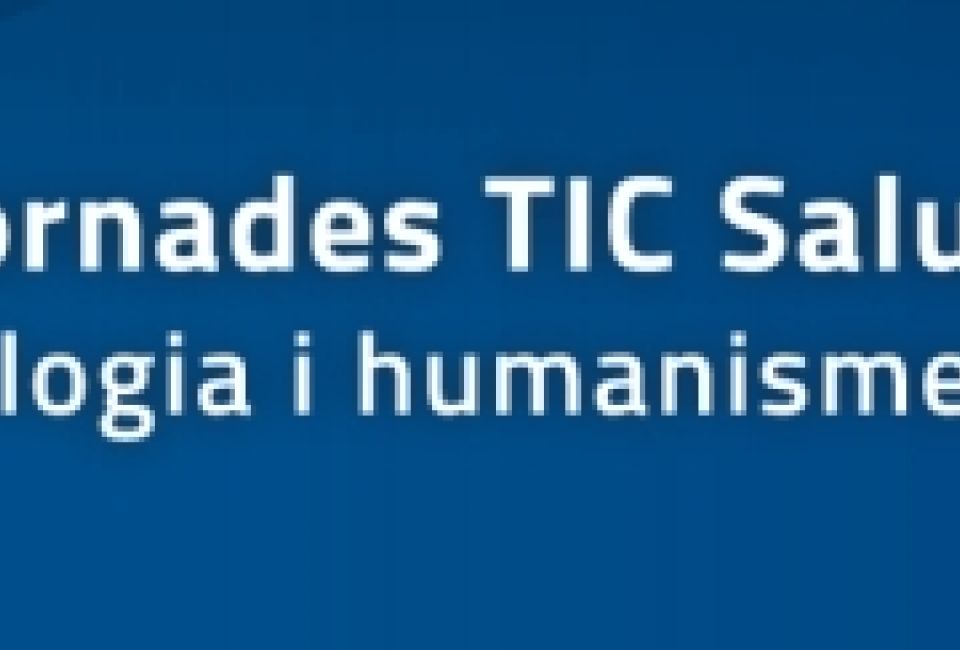
Digital therapies: the drugs of the future?
Recording the daily life of Alzheimer's patients in the initial stages of the disease and so that they can view the images later, to help them remember; using mobile applications to diagnose dyslexia and facilitate the learning of children affected by this difficulty; prescribing augmented reality treatments as a resource for overcoming phobias, such as the fear of snakes, flying or open spaces. These are just three examples of digital therapies, or in other words, how technology is being used to improve the health and quality of life of individuals and the community. These therapies will be the focus of the eighth R+D+I ICT Health and Social Seminars , which will be held in the El Sucre building in Vic on 27 and 28 September.
The seminars will take an in-depth look at the latest breakthroughs in these therapies, and will consider their role as substitutes or supplements for traditional drugs, treatments and educational instruments. Examples of how they are used as an organisational model in social and health organisations will also be presented, and the seminars will consider how they should adapt to the new scenario, and the knowledge and skills that professionals need in this context. At the same time, the need for digital therapies to undergo an evaluation and standardisation process equivalent to a clinical trial will be discussed, so that prescribing them has the same safety and guarantees as a medication.
More than 30 speakers and 109 communications registered
The R+D+I ICT Health and Social Seminars programme includes more than 30 speakers and 109 registered communications, in an event jointly organised by the University of Vic - Central University of Catalonia through the ICT Health Chair and the Social Services Chair, the ICT Social Health Foundation, the Hospital Consortium of Vic, the Catalan Health Institute, the Santa Creu de Vic Hospital Foundation, the EBA Vic Sud, the EBA Centelles and the Althaia Foundation. So far, 200 registrations have been received.
The seminars will be organised around two framework conferences and three round table discussions, devoted to digital therapies in neurosciences, the humanisation of organisations through technologies, and the evaluation and debate on technological experiences respectively. The programme will be completed by various complementary activities, including two communication capsule sessions for presenting projects, exhibitions and demonstrations at the Speaker's Corner, a work session of the Pyrenees-Mediterranean Euroregion, and the awards ceremony for the best projects presented. Parallel events will also take place, including a round table discussion on the book Homo Deus by Yuval Noah Harari, and a hackathon on Health and Social ICTs.
Digital therapies in neurosciences: dyslexia and Alzheimer's
The first round table in the programme, at 11 am on Thursday, will feature Dr Luz Rello, a linguist, a doctor in computer science and a specialist in dyslexia, a specific learning difficulty that she suffers from herself. Since receiving her doctorate from Pompeu Fabra University, she has been engaged in research at Carnegie Mellon University (USA) for the last four years, and has founded Change Dyslexia, a social organisation to identify and treat dyslexia using a test that can be carried out through a mobile application. The day before, Rello will also give a lecture on identifying and providing support for dyslexia (at 6 pm in the Sala Segimon Serrallonga at the UVic).
Dr Maite Garolera, a doctor in Psychology from the University of Barcelona, and a specialist in clinical psychology and head of the Neuropsychology Unit of the Terrassa Health Consortium, which has introduced digital therapies in the treatment of Alzheimer's patients, will also be participating in the round table. The session will focus on the use of digital therapies in neuroscience, and how the techniques and methodologies with which they work enable patients' emotions, body sensations and discomfort to be relieved quickly and effectively, based on scientific breakthroughs such as virtual reality and artificial intelligence.
On the same day, Dr Mateo Valero will give the first framework paper (9.30 pm), which will focus on the contributions of the Barcelona Supercomputing Center, where he has been the director since it was established in 2004, in the field of digital therapies and personalised medicine. Valero is a doctor in Telecommunications Engineering, and a professor in the Department of Computer Architecture at the Polytechnic University of Catalonia (UPC). The other lecture will begin the programme on Friday (at 9.30 am) and will be given by Dr Samuel Sànchez, of the Institute for Bioengineering of Catalonia (IBEC), an expert in nanotechnology.
The R+D+I ICT Health and Social seminars
The programme is aimed at professionals and researchers in various disciplines (health, social, technology, business, etc.) motivated by the ICT, Health and Social areas, entrepreneurs and companies in the same sectors, CEOs and specialists in healthcare institutions and university and higher secondary education students, and students on training cycles. After being held on eight occasions, they are now a major platform for the transfer of knowledge, which helps to align the world of research, business and care. The objective is convergence on solutions with higher added value, which foster social and healthcare integration centred on the individual and the community. Apart from the organising institutions, the strategic partners are the City Council of Vic, the Pyrenees-Mediterranean Euroregion, Barcelona Provincial Council, Acció, the Innovation FORUM, COPLEFC, m4Social and the Catalan Third Social Sector Organisations Committee.